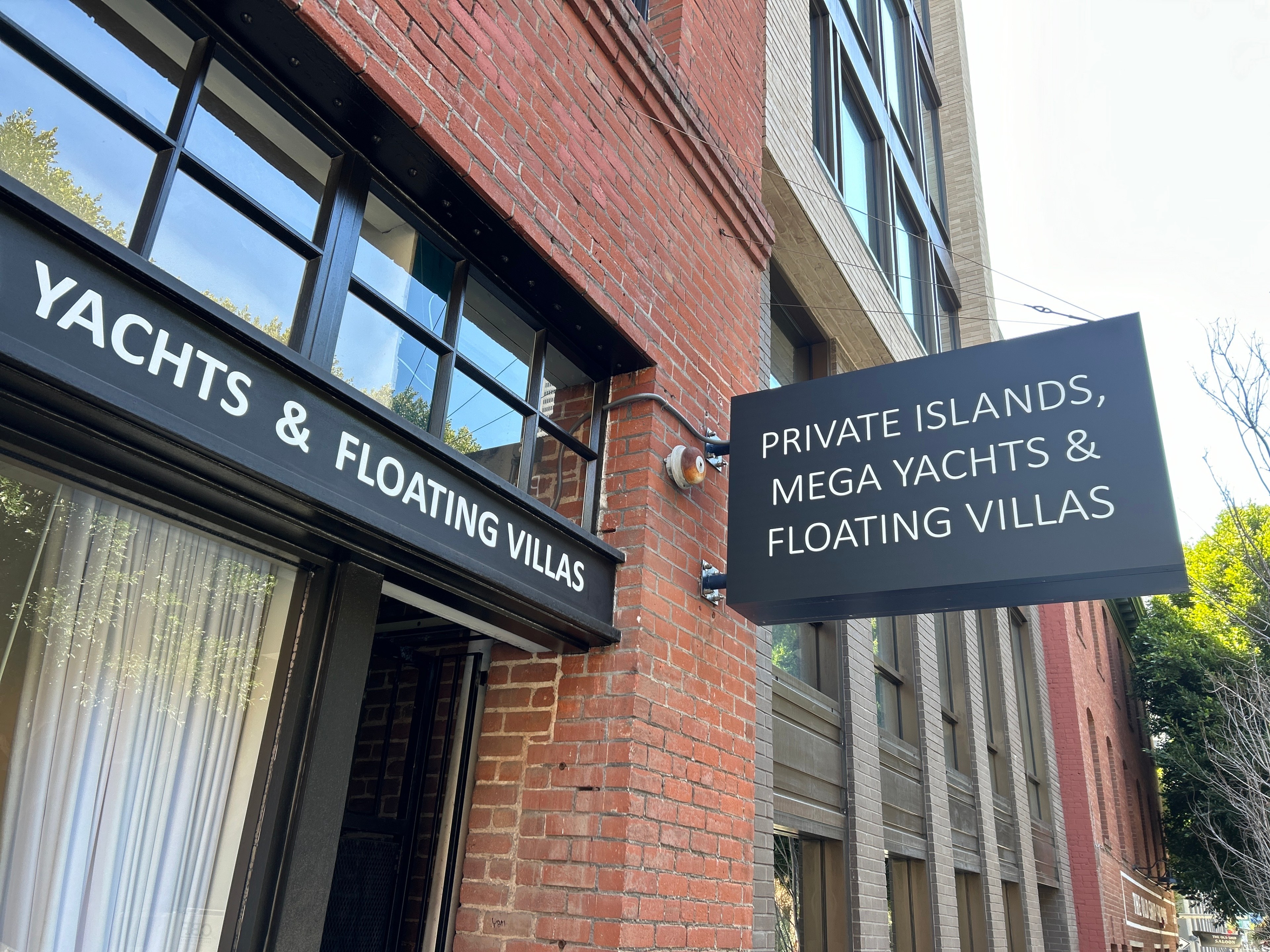Until last week, I never thought much about buying myself an island. And not just because I pat myself on the back whenever my savings account balance has one comma in it, to say nothing of three.
Islands, at least the habitable ones, seem mostly spoken for. Any isle left over can’t be that desirable a haven—or can it?
A new showroom called Private Islands Worldwide that opened last week in San Francisco’s tony Jackson Square wants to change that, helping the world’s ultra-affluent buy or rent coral-fringed atolls in Polynesia or conifer-covered outcroppings in the Maritimes, as well as a range of yachts, floating villas, helicopters and other must-haves for any island owner.
Two German firms—shipbuilder Meyer Floating Solutions and realtor Vladi Private Islands, which also has offices in Canada and New Zealand—are brokering these dazzlingly rare transactions. Prices range widely: The 225-acre Katafanga Island in eastern Fiji is available for $17 million, while the 30-acre Little La Mouna Island in Nova Scotia’s Ponhook Lake can be yours for only about $250,000.
Last week, I dropped by the showroom to speak with Farhad Vladi, the owner-manager of Private Islands, and Lars Kruse, Meyer’s head of sales and design. The space—formerly home to a real estate agent selling luxury residences on the comparatively mundane Yerba Buena Island—is large but low-key, befitting the “quiet luxury” that characterizes the neighborhood.
Inside are sepia maps from the Age of Exploration, models of yachts and framed aerial photographs of pristine reefs and cays. A wall-mounted mission statement promises “peace, privacy & perfection”—and true to form, these are all places where billionaires and oligarchs can dock a floating villa and wait out the apocalypse beyond the reach of Interpol or TMZ.
I asked Vladi to tell me, in his words, what the appeal of owning an island is.
“The emotional links to islands are very strong,” he said. “The difficulty in the island business is to get islands on the market, because whoever has an island doesn’t want to give it away again.”
‘That’s, let’s say, a starting price’
Vladi refers to the reasons people unload their islands as the three D’s: death, debt and divorce. Yet despite the looming specter of the D’s, the ethos of the showroom feels decidedly more cheerful and techno-optimistic.
A fit, blond man who spoke in a Teutonic staccato, Kruse answered all my inquiries with an easy authority. He almost managed to conceal his boredom with my tackiest question: How much does one of his company’s yachts cost?
“If you’re talking about a 150-meter yacht, it starts at something around $370 million,” he said. “But that’s, let’s say, a starting price.”
In practice, the minimum length for a “superyacht” is 80 meters, approximately 250 feet. A Meyer can go up 305 meters or more, and these are all custom-made products, with no two alike. “It’s not like a Ford car dealership,” he added. But the real fun lies in what Kruse called “the toys,” things like helicopters, artworks and smaller vessels, all of which typically run another $100 million.
The “floating villas” that are Meyer’s true specialty are manufactured in Turku, Finland. Imagine the top five or six curvilinear decks of a cruise ship sheared off the boat and plunked on a platform, with a palm or two for shade, and you’ll have a rough idea of what they look like. Such villas range from 1,400 square meters to 10,000 square meters, or five times the size of the largest San Francisco mansions.
Whether positioned just off Dubai as rental properties or towed to an uninhabited oasis in the South Pacific, floating villas are typically built as modular companions for superyachts. The docking procedure is seamless, Kruse said. Passengers don’t even feel it.
Meyer emphasizes the villas’ low environmental impact, which has some basis in fact. Mooring just offshore means little to no destruction to a fragile ecosystem. Electricity costs on such a beast might seem prohibitive, so Meyer uses hydrogen fuel cells. When you’re stationary, even off-the-grid, Kruse insisted that energy use isn’t so bad. “The highest consumption would be even when the missus is going to take a bath at the same time the sauna is on and the kids are playing PlayStation,” he said.
Unsurprisingly, Kruse would not reveal any clients by name or nationality beyond the most general geographic terms. “There is a certain market in Europe,” he said. “There is a big market in the Middle East. There’s a small market in the U.S.”
Some fraction of that small American market must be here in and around San Francisco, or else Meyer and Vladi would not be. But the Bay Area’s ultra-affluent have a somewhat tortured history with private islands, whether they be artificial libertarian enclaves free from government intrusion—see Peter Thiel’s possibly abandoned Seasteading project—or a tendency to treat entire nations like hot listings. In 2022, Sam Bankman-Fried’s cryptocurrency exchange FTX had allegedly mulled purchasing the equatorial nation of Nauru, something the disgraced mogul’s legal team strenuously denied.
“You can use this as an escape, sure,” Kruse said. “That would definitely make other people jealous.” But a lot of the applications are commercial, he said. That means investment properties and hotels as opposed to bunkers bobbing on the waves.
Blustering swagger this is not, and the showroom’s vibe evokes sober German engineering far more than vulgar ostentation. Still, for everyone contemplating a private paradise, there are many more in San Francisco who can only dream of one day existing on an island of their own.
Heading out the door with an armful of glossy brochures, I walked down the block to the Old Ship Saloon, a business built around a very different kind of boat. Maybe the bartender had been enticed by the new neighbor and stopped into the showroom?
“Nope,” he said. “Never heard of them.”
